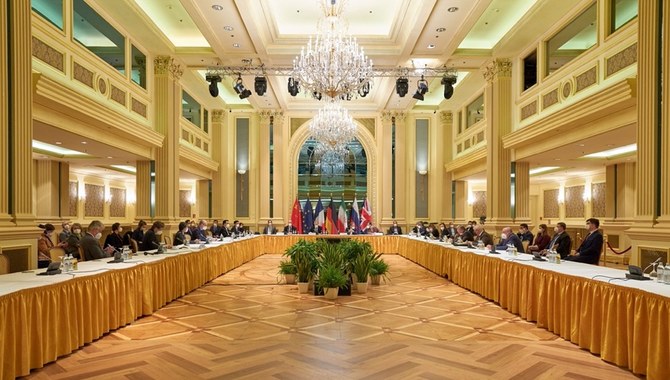WASHINGTON: White House officials believe Iran is inching closer to becoming a nuclear threshold power and could be just weeks away from producing both sufficient fissile material and the necessary technology to weaponize and deliver a nuclear payload.
Reaching the milestone of a significantly shorter breakout period to building a nuclear bomb would give Iran a great deal of leverage and bargaining power in future negotiations even as it seeks hegemony over the Middle East in accordance with its grand strategy.
Despite a concerted effort by the Biden administration to coax Iran to return to the 2015 nuclear deal, indirect negotiations between the two sides have hit a roadblock owing to Tehran’s insistence that the Islamic Revolutionary Guard Corps be removed from the US list of designated foreign terrorist organizations.
Jason Brodsky, policy director at United Against Nuclear Iran, an advocacy group based in Washington, believes Iran has been free to push ahead with its nuclear program because Western powers have lacked the commitment to set firm conditions.
“On advanced centrifuge research and production, Iran has made significant progress over the last year — particularly after it started enriching uranium to 60 percent, and in its production of uranium metal,” Brodsky told Arab News.
“This all happened because the Iranians tested the international community’s red lines and found out that what once were thought to be red lines were not really red lines.”
If recent Middle East history is any guide, the Obama-era nuclear deal with Iran, formally known as the Joint Comprehensive Plan of Action, did not slake the thirst of the regime in Tehran for nuclear arms or regional dominance.
US President Joe Biden hopes to reverse his predecessor’s decision in 2018 to withdraw the US from the 2015 nuclear accord. The Trump administration believed the deal did little to prevent Tehran from obtaining a nuclear weapon, stem its ballistic missile program, or halt its malign activities across the Middle East.
According to Brodsky, even after the sobering experience of crippling sanctions slapped on the Iranian economy by the Trump administration following the withdrawal from the JCPOA, the regime in Tehran still harbors nuclear ambitions.
Negotiations in Vienna between Iran, the US and the other original JCPOA co-signatories — China, France, Germany, Russia and the UK, along with the EU — have stalled. In Brodsky’s view, Tehran is deliberately playing for time in the hope of strengthening its bargaining position.
“The Iranians for over a year have been dragging out the negotiations to advance their nuclear program so that it produces a shorter and weaker deal for the West while notching a stronger agreement for itself in the form of non-nuclear sanctions relief,” he said.
While the international community is preoccupied with the conflict in Ukraine and the threat of an armed confrontation between Russia and NATO, a moment of reckoning looms when Washington will have to decide whether the talks with Iran have reached a dead end.
Andrea Stricker, a research fellow at the Foundation for Defense of Democracies, believes Iran is rapidly approaching a nuclear milestone that cannot be dealt with at a later date through a watered-down deal.
“It is concerning that Tehran is close to amassing enriched uranium sufficient for a nuclear weapon but Washington’s intention appears to be to scare recipients of this message into supporting a revived Iran deal,” she told Arab News.
“The IAEA has not been able to complete its investigation into whether Iran’s program maintains military dimensions, which is why the deal’s proposition of loosening restrictions on the enrichment side over time makes no sense,” she said.
In her view, if the Biden administration wants to halt its tumbling poll ratings, it needs to set much firmer conditions for Iran to follow in exchange for sanctions relief and a revived nuclear deal.
“A policy reset requires scrapping any legalization of Iran’s enrichment program and requiring full transparency and IAEA access,” Stricker said. “Tehran should prove to the world that the nuclear program is fully peaceful before it gets relief from sanctions.”
By all accounts, the likelihood of Iran opting for the straight and narrow is slim to none. On Monday, Ali Bahadori Jahromi, an Iranian government spokesman, told state media that Iran intends to continue the negotiations for a nuclear deal until its “national interests are fully and comprehensively protected.”
The Biden administration therefore might have to quickly reevaluate the utility of offering Iran practically everything it is asking for on a silver platter and, instead, begin charting a new policy course that takes into account the hard reality of the regime’s unabated nuclear-weapons development.

